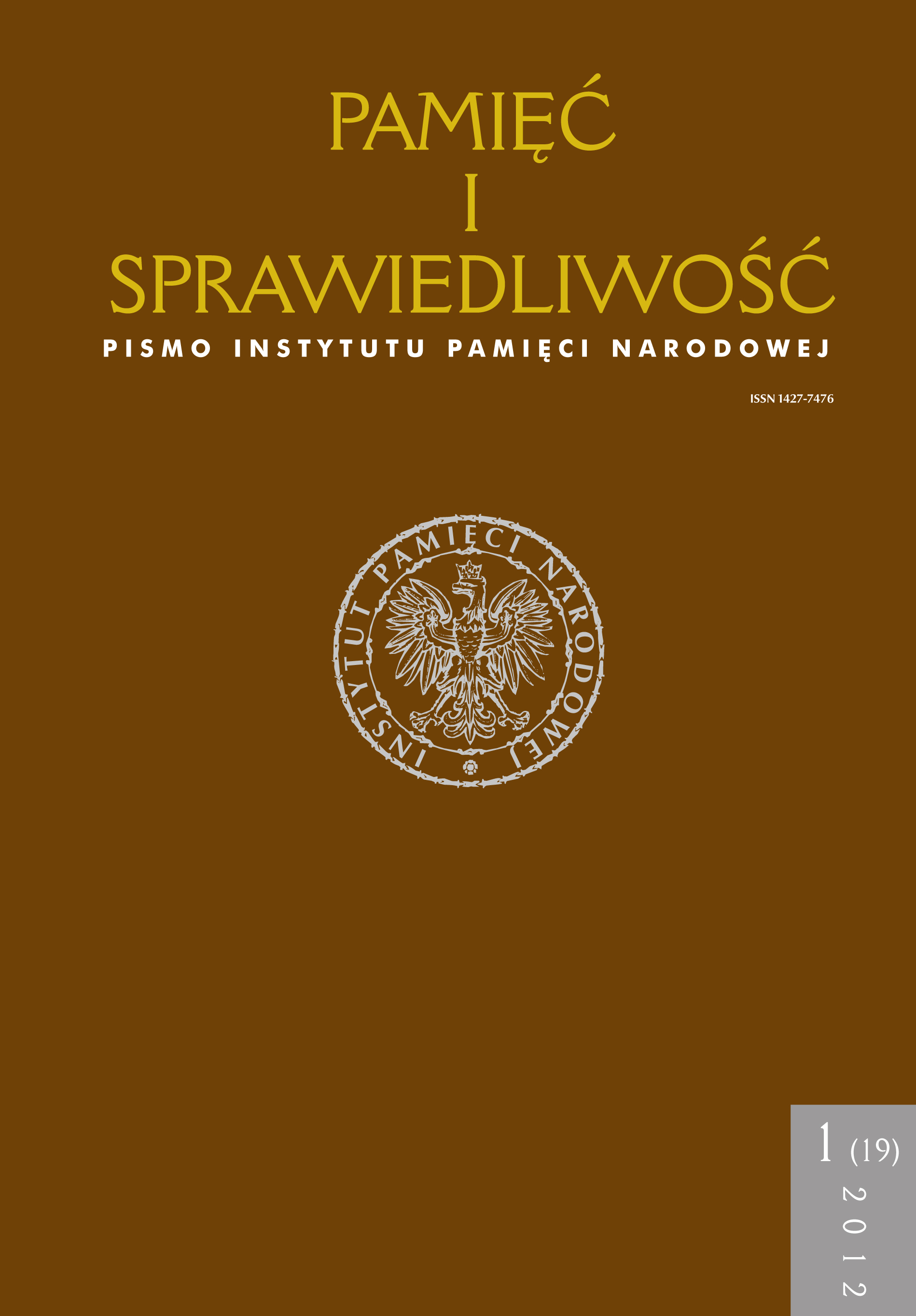“The Polish language is so rich, fl exible is our talk!”. The Basic Party Cell (POP) of the Warsaw Branch (OW) of the Polish Writers’ Association (ZLP) and its attitude towards the policies of PZPR’s (Polish United Workers’ Party’s) leadership in the years 1956–1970
Remembrance and Justice, Vol. 19 No. 1 (2012), pages: 135-181
Publication date: 2012-06-30
Abstract
References
D. Jarosz, Polacy a stalinizm 1948–1956, Warszawa 2000, L. Prorok, Dziennik 1949–1984, Kraków 1998, O.S. Czarnik, Między dwoma sierpniami. Polska kultura literacka w latach 1944–1980, Warszawa 1993, . B. Fijałkowska, „Sumienie narodu”? Sprawy i ludzie kultury w Polsce Ludowej, Wrocław 1985, A. Paczkowski, (Bardzo) Krótki zarys politycznej historii prasy polskiej w latach 1944–1989 [w:] Pośród spraw publicznych i teatralnych. Marcie Fik przyjaciele, koledzy, uczniowie, red. M. Napiontkowska, J. Krakowska-Narożniak, Warszawa 1998, s. 270. B.N. Łopieńska, Porwanie „Europy”, „Res Publica” 1987, nr 2, H. Zatorska, Spoza smugi cienia, Warszawa 1982, A. Werblan, Szkice i polemiki, Warszawa 1970, T. Mielczarek, Od „Nowej Kultury” do „Polityki”. Tygodniki społeczno-kulturalne i społeczno-polityczne PRL, Kielce 2003, A. Bikont, J. Szczęsna, Lawina i kamienie. Pisarze wobec komunizmu, Warszawa 2006 J. Putrament, Pół wieku, t. 5: Poślizg, Warszawa 1980, J. Putrament, Pół wieku, t. 6: Natasza (nowa wersja „Rapanui”), Warszawa 1978, Analiza postaw politycznych pisarzy sporządzona przez kontakt obywatelski „O”, przyjęta przez wicedyrektora Departamentu III MSW płk. Stanisława Filipiaka, 5 XII 1962 r., oprac. K. Rokicki [w:] Twórczość obca nam klasowo. Aparat represji wobec środowiska literackiego 1956–1990, red. A. Chojnowski, S. Ligarski, Warszawa 2009, s. 148. K. Rokicki, Nie wygracie z partią. Sprawa warszawskiej „Kultury” 1963, „Biuletyn IPN” 2008, nr 8–9, W. Gomułka, O aktualnych problemach ideologicznej pracy partii, „Nowe Drogi” 1963, nr 8, A. Friszke, Kultura czy ideologia? Polityka kulturalna kierownictwa PZPR w latach 1957–1963 [w:] Władza a społeczeństwo w PRL. Studia historyczne, red. A. Friszke, Warszawa 2003, s. 141-142. K. Woźniakowski, „List 34” i literaci, „Zdanie” 1988, nr 6; J. Eisler, List 34, Warszawa 1993; T. Jastrun, Mysz, która ryknęła, „Nowa Res Publica” 1994, cz. 1, nr 3, s. 2–12; cz. 2, nr 4, s. 17–25; K. Rokicki, Sprawa „Listu 34” w materiałach MSW, „Polska 1944/45–1989. Studia i materiały” 2006, nr 7, ; M. Fik, My, niżej podpisani, „Res Publica Nowa” 1994, nr 5, A.J. Cieślikowa, O człowieku, który się nie zgadzał. Biografia pułkownika Januarego Grzędzińskiego 1881–1975, Warszawa 2009 J. Kuroń, K. Modzelewski, List otwarty do partii, Paryż 1966 A. Friszke, Opozycja polityczna w PRL 1945–1980, Londyn 1994, A. Friszke, Ruch protestu w marcu 1968 r. w świetle raportów MSW dla kierownictwa partyjnego, „Więź” 1994, nr 4, J. Eisler, Polski rok 1968, Warszawa 2006, N. Karsov, S. Szechter, Nie kocha się pomników, Warszawa 1987. K. Rokicki, Służba Bezpieczeństwa wobec inteligencji twórczej od Października ‘56 do Marca ‘68, „Pamięć i Sprawiedliwość” 2006, nr 2, B. Stanisławczyk, D. Wilczak, Pajęczyna [w:] Teczki, czyli widma bezpieki, red. J. Snopkiewicz, A. Jakubowska, D. Wilczak, Warszawa 1992, s. 139-140. B.N. Łopieńska, „Szczerze mówiąc – nie”, „Res Publica” 1991, nr 7–8, L. Ostałowska, Mord w oranżerii, „Gazeta Wyborcza”, 31 XII 1996 – 1 I 1997 M. Fik, Autorytecie wróć? Szkice o postawach polskich intelektualistów po październiku 1956, Warszawa 1997, M. Jastrun, Dziennik 1955–1981, Kraków 2002, I. Szymańska, Miałam dar zachwytu. Wspomnienia wydawcy, Warszawa 2001, J. Putrament, Pół wieku, t. 7: Zmierzch, Warszawa 1980, K. Kersten, Marzec 1968 a postawy intelektualistów wobec komunizmu [w:] Marzec 1968. Trzydzieści lat później, t. 1: Referaty, red. M. Kula, P. Osęka, M. Zaremba, Warszawa 1998, s. 178. S. Kisielewski, Dzienniki, Warszawa 2001, M.F. Rakowski, Dzienniki polityczne, t. 3: 1967–1968, Warszawa 1999, , W. Gomułka, Przemówienia. Wrzesień 1957–grudzień 1958, Warszawa 1959,
Most read articles by the same author(s)
- Grzegorz Waligóra, Andrzej Friszke, Jerzy Eisler, Konrad Rokicki, Łukasz Kamiński, Grzegorz Waligóra, [Dyskusja] Między Październikiem a Czerwcem. PRL 1956–1976 , Remembrance and Justice: Vol. 19 No. 1 (2012)
- Konrad Rokicki, Chrzest bojowy ZOMO , Remembrance and Justice: Vol. 11 No. 1 (2007)
- Konrad Rokicki, The Security Service and creative intellectuals between the Polish October ’56 and March ’68 , Remembrance and Justice: Vol. 10 No. 2 (2006)
- Konrad Rokicki, Letters and complaints concerning the activities of the Ministry of Internal Affairs (MSW) in the1960s, 70s and 80s of the 20 th century in the analysis of the Office for Complaints and Letters of MSW , Remembrance and Justice: Vol. 21 No. 1 (2013)
 Język Polski
Język Polski
 English
English
 Deutsch
Deutsch
 Français (France)
Français (France)
 Italiano
Italiano
 Русский
Русский


 PDF (Język Polski)
PDF (Język Polski)
